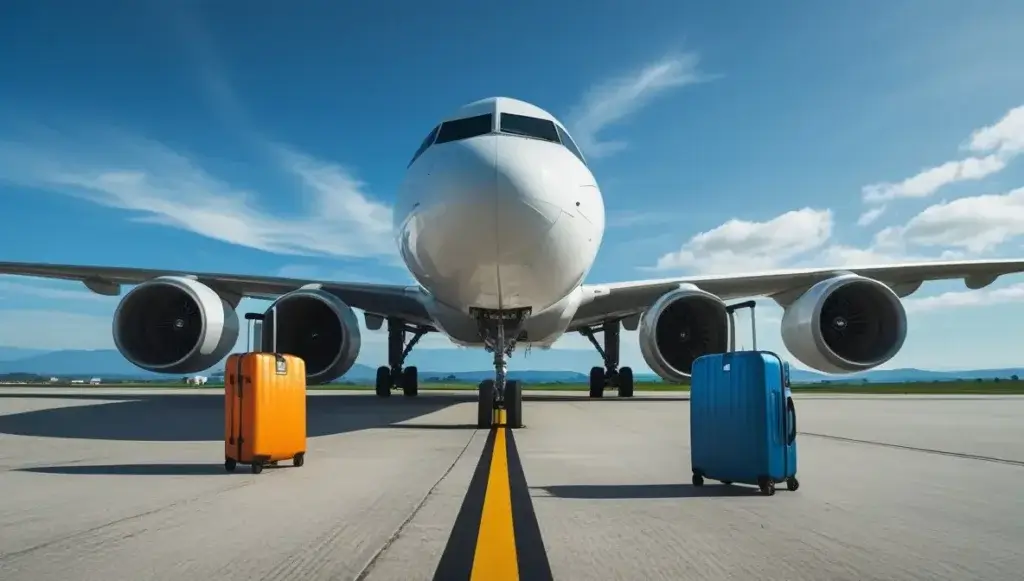Traveling with your partner is one of life’s most rewarding experiences—but it doesn’t have to empty your wallet. In fact, with a bit of planning, couples can often travel more affordably than solo travelers. Whether you’re planning a romantic getaway, a backpacking adventure, or a long-term travel journey, this guide will show you how to stretch every dollar without sacrificing the fun or romance.
1. Why Traveling as a Couple Can Be Cost-Effective

Image Credit: Unsplash
Shared Expenses That Reduce Costs
Let’s face it—one of the biggest perks of traveling as a duo is splitting the bill. Whether you’re booking a hotel room, calling a taxi, or renting a car, the cost often remains the same regardless of whether it’s one person or two. That means instant savings when you divide the expenses.
For example, accommodations usually charge per room, not per person. That $60 Airbnb? Still $60 whether you’re solo or with your partner. Split it, and suddenly you’re both only paying $30 per night. The same logic applies to car rentals, ride shares, and even meals—many restaurants offer combo deals or portions large enough to share.
Even guided tours or attractions often offer “couples rates” or discounts for two, and the more you travel together, the more you’ll naturally find ways to optimize costs by sharing.
The Benefit of Joint Planning and Budgeting
Traveling as a couple also means two minds working together to plan smarter. You can divide the workload—one person looks for flights, the other scouts hotels. Together, you can balance what’s essential (romantic dinners, cozy stays) with what’s not (overpriced guided tours or luxury extras).
Budgeting as a couple can also help you stay accountable. When one of you feels tempted to splurge on an unnecessary expense, the other can help keep things in check. Set financial goals together, decide what you’re both willing to spend on experiences, and hold each other accountable along the way.
With clear communication and teamwork, traveling as a couple becomes not just more fun—but more financially efficient too.
2. Planning Smart: The Foundation of Budget Travel
Setting a Clear Travel Budget Together
Before you book anything, it’s crucial to sit down together and set a travel budget. Not just a vague “let’s not spend too much” idea—but an actual number. Decide on a total figure and then break it down:
- Flights
- Accommodation
- Food & drinks
- Activities & excursions
- Local transportation
- Emergency fund
When both partners are on the same page financially, you avoid stress and miscommunication on the road. Discuss your priorities—is it luxury stays or street food adventures? Adventure tours or relaxed beach days?
Use budgeting apps like Trail Wallet or Splitwise to track spending as you go. It keeps things transparent and helps you quickly identify areas where you’re overspending.
Researching Destinations with Couples’ Discounts and Deals
Not all destinations are created equal when it comes to couples’ travel. Some places naturally offer better value for two. Think: romantic getaways that aren’t swamped with luxury pricing. Southeast Asia, Central America, Eastern Europe, and parts of South America are great examples of budget-friendly destinations with romantic appeal.
Also, keep an eye out for:
- Couples’ spa packages
- Two-for-one museum or tour tickets
- Romantic dinner deals
- Transport passes for two
Don’t forget to check local tourism boards for promotional discounts or travel cards. Cities like Paris, Prague, and Kyoto often have multi-attraction passes that can cut your sightseeing costs significantly—especially when bought as a pair.
3. Booking Flights on a Budget

Image Credit: Canva
Using Fare Comparison Tools and Flexible Dates
Flights are one of the biggest travel expenses, but couples have a secret weapon: flexibility. If you and your partner can adjust your travel dates by even a day or two, you can save hundreds.
Use fare comparison tools like:
- TripAdvisor
- Expedia
- Trip.com
- Aviasales
- Google Flights
- Skyscanner
- Hopper
- Momondo
These platforms allow you to see a month’s worth of fares so you can spot the cheapest days to fly. You can also set up price alerts to get notified when fares drop for your desired route.
Booking as a couple? Try searching for one ticket at a time first. Airlines sometimes show higher prices when two tickets are selected due to seat class availability.
Another trick? Be open to flying into nearby airports or even using budget airlines for one leg of the journey. Sure, it might mean an extra bus ride—but the savings can be substantial.
Taking Advantage of Companion Fares and Loyalty Programs
Some airlines offer “companion fares” where your partner flies for free or at a discounted rate when you purchase a full-price ticket. These are often part of credit card travel programs or airline-specific promotions.
For instance:
- Alaska Airlines has a Companion Fare benefit for cardholders.
- British Airways lets you use Avios points and pay reduced fees for a second traveler.
If you’re frequent travelers, sign up for loyalty programs. Pooling your miles or points into one account can rack up faster benefits, like free flights, upgrades, or checked baggage waivers.
Even credit cards with travel rewards can help cut costs dramatically—especially if you use one card to pay for shared expenses and redeem the points together.
4. Affordable Accommodation Options

Image Credit: Expedia
Choosing Alternatives to Hotels Like Hostels, B&Bs, or Vacation Rentals
Hotels can be convenient, but they’re rarely the best deal—especially when you’re looking to travel affordably as a couple. Instead, explore alternatives:
- Expedia: Often cheaper per night than hotels, and you get access to a kitchen (hello, home-cooked dinners).
- Hostels with private rooms: Many now offer ensuite double rooms that are budget-friendly and couple-friendly.
- Bed and Breakfasts: These offer charm, a local experience, and often include breakfast in the price.
- Guesthouses: Especially common in Asia and Eastern Europe, these are often family-run, affordable, and very comfortable.
Bonus? You get more space, more amenities (like laundry or a kitchenette), and a more personal experience.
Using Apps and Websites for Last-Minute Deals
If you’re flexible, last-minute bookings can score you steep discounts. Try:
- Expedia – Offers last-minute deals on high-quality hotels.
- TripAdvisor– Their “Genius” program gives extra discounts after just a few bookings.
- Agoda – Especially useful in Asia for flash sales and coupon codes.
Also, consider direct booking with a hotel or property manager. Sometimes, they’ll offer a better rate than third-party websites—especially if you ask politely or mention you’re a couple celebrating something (anniversaries go a long way!).
5. Eating Well Without Breaking the Bank
Cooking Together and Shopping at Local Markets
Dining out for every meal adds up quickly. One of the best parts of traveling as a couple is having the option to cook meals together. It’s not just budget-friendly—it can be incredibly romantic too.
Stay in places with a kitchen or at least a mini-fridge and kettle. Then hit up local markets:
- Fresh produce
- Regional cheeses
- Bread, wine, and snacks
Imagine enjoying a sunset picnic with a bottle of local wine and fresh baguettes in Paris or grilling seafood you bought from a market in Thailand—sounds like a scene from a travel blog, but it’s totally doable on a budget.
Cooking even one or two meals per day can save you $20–$50 daily as a couple.
Finding Local Eats and Avoiding Tourist Traps
The golden rule? If a restaurant has a picture menu and a guy waving you in—walk away. Tourist traps are overpriced and underwhelming.
Instead:
- Ask locals for food recommendations.
- Check Google reviews or apps like Yelp or TripAdvisor (but read recent reviews, not just star ratings).
- Explore street food stalls—especially in places like Bangkok, Mexico City, or Istanbul where street eats are both iconic and cheap.
Eating like a local not only saves money—it gives you a more authentic experience.
6. Budget-Friendly Transportation Tips

Image Credit: Unsplash
Using Public Transportation Over Taxis or Rideshares
Public transport is not only cost-effective—it’s also one of the best ways to immerse yourself in a new place. As a couple, you can buy daily or weekly transit passes that often come at a reduced rate compared to single-trip fares.
Metro systems, trams, buses, and even ferries in major cities are designed to be tourist-friendly. In places like London, Tokyo, or Berlin, efficient transit systems mean you’ll save both time and money. For example:
- London: An Oyster card cap limits how much you’ll be charged in a day.
- Bangkok: Skytrain passes offer unlimited rides for a fixed daily price.
- Barcelona: A T-Casual card gives you 10 rides for a great deal.
Apps like Moovit, Rome2Rio, or Citymapper can help you navigate routes with ease. And when you’re traveling together, you’ll feel more secure using unfamiliar systems, which makes the experience even more comfortable and adventurous.
Walking and Biking for the Win
Never underestimate the power of your feet or a rented bike. Walking through cities not only costs nothing—it allows you to stumble upon hidden gems that you’d never find in a car. Charming alleyways, unexpected art installations, or cozy cafés? They’re waiting for you.
Many cities offer bike-sharing programs where a 24-hour pass is just a few bucks. Riding a tandem bike through a park or along the beach adds fun and romance to your trip—while keeping your wallet happy.
Plus, walking or biking together allows for more intimate travel moments, spontaneous photos, and memories you can’t get while speeding by in a cab.
7. Make Use of Travel Rewards and Credit Card Points
Maximizing Your Travel Rewards Together
If you’re serious about saving money while traveling as a couple, get strategic with travel rewards. Sign up for loyalty programs offered by:
- Airlines (Delta SkyMiles, United MileagePlus)
- Hotel chains (Marriott Bonvoy, Hilton Honors)
- Travel portals (Expedia, Trip.com)
Use one partner’s account to accumulate all points and redeem them faster. Many programs allow you to book rewards for companions using your points.
Some tips:
- Always book flights or rooms through your loyalty account.
- Take advantage of promotions like double points or off-peak redemptions.
- Link accounts or nominate a partner for shared benefits (like free checked bags or lounge access).
It’s like stacking coupons for luxury travel.
Choosing the Right Travel Credit Card
Pick a travel credit card that aligns with your goals. For example:
- Chase Sapphire Preferred/Reserve: Great for flexible travel points and dining.
- Capital One Venture: Easy point system, good for beginners.
- American Express Platinum: Higher fees but premium perks and lounge access.
Some cards offer referral bonuses, companion tickets, or anniversary points—perfect for couples who plan multiple trips a year. Use your card to pay for all shared expenses, then use the rewards to fund your next trip. Just remember to pay it off monthly to avoid interest fees.
8. Timing Your Travel Right
Off-Season Travel for Big Savings
Want to slash prices in half? Travel during the off-season. Every destination has a peak time when flights, hotels, and activities are at their most expensive—and a quiet season when prices drop dramatically.
For instance:
- Europe in April or October = fewer tourists, cheaper stays, beautiful weather
- Caribbean in May or September = lower costs, same turquoise waters
- Japan in winter (excluding holidays) = great for onsen getaways and snow views
Couples benefit the most from off-season travel: more privacy, better service, and less crowd stress.
Research the “shoulder season” (the window between peak and off-peak times) to get the best of both worlds.
Being Flexible with Dates and Duration
Flexibility is your best friend when traveling on a budget. Flights are typically cheaper mid-week than weekends. Flying out on a Tuesday and returning on a Wednesday could shave off hundreds of dollars compared to Friday-Sunday schedules.
Also, play around with trip duration. Sometimes, extending your stay by a day or shortening it slightly can change the fare.
Use tools like TripAdvisor’ date grid or Hopper’s predictive algorithms to see which dates offer the lowest fares.
Even your accommodation costs can be lower on weekdays—many hotels and vacation rentals charge less for Monday through Thursday stays.
9. Travel Insurance: Saving Now vs. Protecting Later

Image Credit: Unsplash
Why Insurance Is Essential for Couples
It might seem counterintuitive to spend money on insurance while trying to save—but one unexpected incident can cost more than your entire trip. Travel insurance is a non-negotiable, especially when you’re covering expenses for two people.
A good plan covers:
- Trip cancellations or interruptions
- Medical emergencies
- Lost or stolen belongings
- Travel delays
Some insurers even offer plans specifically for couples or families, which are cheaper than buying two individual policies.
Companies like Ekta Traveling, VisitorsCoverage, World Nomads, or Allianz offer budget-friendly plans ideal for couples on the go.
How to Find Affordable Travel Insurance
Compare quotes on websites like:
- SquareMouth
- InsureMyTrip
- TravelInsurance.com
Read the fine print and check if your credit card already provides some coverage. Cards like Chase Sapphire Reserve or Amex Platinum include built-in protections for delays, baggage loss, or cancellations—just use the card to book your trip.
Peace of mind for a small investment? Totally worth it.
10. Free (and Romantic) Things to Do as a Couple
Enjoying Nature and Public Spaces
Some of the most romantic experiences in the world are completely free. Picture yourselves:
- Walking hand-in-hand through a scenic park
- Watching the sunset on a beach
- Stargazing from a mountaintop
- Having a picnic under cherry blossoms
Nature doesn’t charge admission. Whether you’re in Costa Rica, Croatia, or California—outdoor beauty is everywhere.
Look for national parks, public gardens, and urban hiking trails. Many cities also have free walking tours or open-air concerts, especially during the summer months.
Making Memories Without Spending a Dime
Beyond nature, you can enjoy:
- Free museum days
- Local street festivals
- Farmer’s markets
- Art galleries
- Historical landmarks
Bring a camera and take turns capturing each other candidly. Start a travel scrapbook or a digital album to commemorate each trip. You’ll create more lasting joy than any souvenir could offer.
The best part? It’s not about how much you spend—it’s about how much time you spend together.
11. Split Costs Fairly Without Stress
Using Apps to Keep Things Equal
Money can get awkward in a relationship—especially on the road. But it doesn’t have to. As a couple, you want to keep things fair without constantly whipping out a calculator.
Enter apps like:
- Splitwise: Track who paid for what and calculate the difference.
- Venmo / PayPal / Revolut: Great for instant transfers if needed.
- Tricount: Another easy app to log expenses and split costs.
These tools help eliminate the awkward “you owe me” chats. Just log expenses as you go, then settle up at the end of the trip.
Even if you don’t split 50/50—maybe one person covers flights, and the other pays for hotels—tracking everything helps you stay balanced and stress-free.
Communicating Clearly About Money
Beyond the tools, honest conversation is key. Before you leave, talk openly about your budget comfort zones. Is one partner okay with splurging on fancy dinners while the other prefers street food? Talk it out.
It’s also good to agree on:
- Daily spending limits
- Who handles which expenses
- How you’ll handle emergencies
This kind of clarity builds trust and ensures you’re both on the same page—financially and emotionally.
12. Travel Hacking as a Couple
Pooling Points and Miles for Maximum Benefits
Want to fly business class for less than coach? Travel hacking makes it possible—and couples have a unique advantage.
By combining your efforts, you can:
- Double the sign-up bonuses by each applying for a travel credit card
- Refer one another to earn extra points
- Share loyalty accounts (some airlines and hotels allow pooled points)
For example, British Airways has a household account feature so both partners can earn and redeem points together. Marriott Bonvoy lets you transfer up to 100,000 points annually to another member.
Focus your spending on one or two cards that offer strong travel rewards and use them exclusively for all shared travel purchases. You’ll rack up points faster—and book bigger redemptions sooner.
Taking Advantage of Sign-Up Bonuses
Look for travel credit cards that offer 50,000+ points as a welcome bonus after hitting a minimum spend. If you each get a card and combine your points, you could be looking at:
- Roundtrip flights for two
- 5-star hotel stays
- Travel credits for activities or food
Just be careful: avoid overspending to chase rewards, and always pay your balances in full each month.
Travel hacking takes a bit of research, but once you learn the system, you’ll never pay full price again.
13. Packing Smart to Avoid Extra Fees
Traveling Light as a Couple
Checked bags are pricey. Airlines now charge for almost everything, and if both partners bring a full suitcase, you could be paying an extra $100+ each way.
Instead, pack light together. Use one shared suitcase or each bring a carry-on. Coordinate clothes that can be mixed and matched, and share toiletries (just remember TSA rules for liquids).
Pro tips:
- Use packing cubes to stay organized
- Bring clothes that layer easily
- Pack a foldable day bag for excursions
Light travel saves money, time at airports, and space in your accommodations. Plus, it’s way less stressful.
Sharing Essentials
Why bring two of everything? Share these items:
- Travel adapter
- Toiletries like toothpaste or sunscreen
- Tech gear (one phone charger or power bank is usually enough)
- First-aid kit
- Books or e-readers
Packing as a team means less duplication and more room for things that matter—like souvenirs or local snacks.
14. Earning While Traveling as a Couple
Remote Work and Digital Nomad Life
Many couples are embracing the digital nomad lifestyle—and using it to fund long-term travel. If one or both of you can work remotely, your travels can last far longer without burning through savings.
Options include:
- Freelance writing, design, or programming
- Online tutoring or teaching
- Remote corporate roles
- Running an online business or blog together
Platforms like Upwork, Fiverr, or Toptal can help you land gigs. If you create content (YouTube, Instagram, blogging), you can also earn through sponsorships or affiliate marketing.
Even a part-time gig can cover your accommodation or food while abroad.
Volunteering or Work Exchanges
You can also trade skills for lodging or food. Sites like:
- Workaway
- WWOOF
- HelpX
…offer opportunities to work on farms, hostels, or in communities in exchange for room and board.
These are perfect for couples and offer rich cultural experiences that go beyond typical tourism—all without spending a dime.
15. Staying Safe and Secure Without Overspending
Affordable Safety Measures for Couples
Traveling smart includes staying safe—without overpaying. You don’t need to book luxury resorts for peace of mind. Just follow a few safety tips:
- Choose well-reviewed accommodations in safe neighborhoods
- Use lockable backpacks and anti-theft bags
- Avoid flashy displays of wealth (no expensive jewelry)
- Keep digital copies of important documents
- Let someone back home know your itinerary
Stick together, especially at night, and avoid isolated areas. Use GPS apps to stay on track, and always keep emergency contacts handy.
Emergency Prep Without the Price Tag
Basic preparedness goes a long way. Carry:
- A small first aid kit
- Medications you may need
- Local SIM card or offline maps
- Emergency cash (split between the two of you)
None of this is expensive, but it can save you big time if something goes wrong.
Being prepared = being empowered. And that’s priceless.
Conclusion
Traveling as a couple doesn’t have to be expensive. In fact, it can be one of the most budget-friendly ways to explore the world—if you do it right. From splitting costs and cooking meals together to hacking travel rewards and choosing budget-friendly destinations, every dollar you save can go toward your next adventure.
The key is teamwork. Plan together. Budget together. Explore together. Because when you’re both committed to making smart choices, not only do you stretch your funds further—you build a travel experience that’s richer, deeper, and filled with unforgettable memories.
So go ahead, grab your partner, and book that trip. Just do it smart, and your wallet will thank you.
FAQs
1. What are the best destinations for couples on a budget?
Destinations like Thailand, Portugal, Vietnam, Mexico, and Eastern Europe (like Romania or Georgia) offer incredible experiences at low costs. These places provide great value for food, accommodations, and activities.
2. How can we split travel expenses fairly without fighting about money?
Use apps like Splitwise or Tricount to track expenses and settle up at the end of the trip. Open communication before and during the trip about budget limits and spending habits is also key.
3. Are there any specific credit cards couples should use for travel?
Cards like the Chase Sapphire Preferred, Capital One Venture, and American Express Platinum offer great travel rewards, companion benefits, and perks like trip insurance and airport lounge access.
4. Is travel insurance really necessary for couples?
Absolutely. It protects against cancellations, delays, lost luggage, or medical emergencies. Many policies also offer discounts or better coverage for couples traveling together.
5. Can we really travel long-term as a couple without spending a lot?
Yes! Through remote work, house-sitting, volunteering, and travel rewards, many couples fund extended trips affordably. It takes planning, but it’s very doable.

